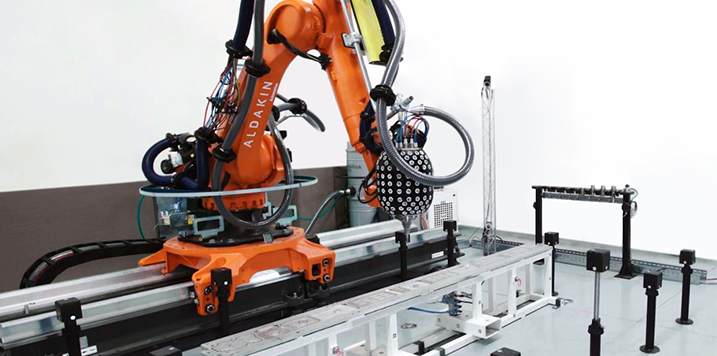 27 May, 2024
27 May, 2024Carbon fibre or glass fibre composite parts are becoming increasingly common in sectors such as aeronautics, automotive, construction and wind power due to their lightness and high strength. For example, in the case of electric vehicles, these composites allow the car to be lighter in order to reduce its fuel consumption.
To assemble these parts precisely, it is necessary to cut and drill the composite parts. However, during these machining processes, a large amount of dust is generated which is harmful to health and can cause respiratory difficulties, dermatitis, conjunctivitis and some of the chemical components are even classified as potentially carcinogenic.
There are currently two methods for carrying out these machining processes. One is by milling machines, which offer high precision but require considerable investment. The other involves manual operations, with a consequent reduction in precision and increased exposure of operators to toxic dust, noise and vibration.
With the challenge of limiting this exposure as much as possible and offering the European manufacturing industry a cleaner and safer machining alternative, the IDEKO technology centre has developed and validated within the framework of the European Fibremach project a new robotic solution capable of machining with the precision required for composite parts and with a reduced investment.
The equipment also incorporates a patented IDEKO technology in the head that allows 100% of the toxic dust particles to be sucked up from the cutting edge of the tool itself, preventing them from floating in the air.
‘The dust produced in these processes is not only harmful to people, but also to the service life of the machines themselves due to its abrasive and electrically conductive properties. In the long term, this dust ends up damaging the mechanical components of the machines and can cause short circuits in the electronic systems, which is why it is essential for these manufacturers to have a solution of these characteristics", emphasises Asier Barrios, IDEKO's project manager.
Precision and controlThe chip and dust suction technology is just one of the innovations developed during the project, which has resulted in a robotic cell for machining composite materials that is more precise and highly productive.
The IDEKO team, made up of its four research groups, has also worked on improving the precision and control of the robot machining process to meet the needs and demands of the manufacture of composite parts.
IDEKO has developed an artificial vision system that increases the robot's precision, using various cameras and photogrammetric algorithms.
‘The developed robot continuously and at high speed corrects its position and orientation based on camera measurements. This allows machining with an accuracy of between 0.1 and 0.2 millimetres throughout the robot's work area, which improves the robot's accuracy by a factor of four times its original capacity,’ adds Asier Barrios.
In addition, to guarantee the quality of the machined parts, a continuous vibration monitoring and control system has been developed. Sensors integrated in the robot are used to measure and analyse the vibrations generated during machining. If excessive vibrations are detected, which may be caused by poorly clamped tooling or worn tools, the robot automatically modifies its feed and cutting tool rotation speed to reduce vibrations and prevent damage to the workpiece.
All information about the robot status and the machining process is thus recorded in the cloud. This information can be consulted to analyse exactly how each part has been machined, and even allows the integration of Artificial Intelligence functions that work on the data in the cloud to optimise productivity.
The robotic architecture designed offers the possibility of easily scaling the solution, adapting the systems created to robots of different sizes to respond to the need to machine parts of different volumes. ‘This will allow companies that mill, trim and drill composite parts manually to adopt a robotic solution that protects their workers and increases their productivity,’ concludes Barrios.
Manufacturing innovation awardIn 2023, the European Association of Manufacturing Technologies CECIMO awarded the developments of the Fibremach project in the first edition of the Machine Tools Innovation Award, to which a total of 30 initiatives were submitted.
Specifically, it received the first prize from both the public and the jury for the best innovation in the machine tool sector in 2023, recognising IDEKO's pioneering contribution to European industry in moving towards sustainable manufacturing and the adoption of clean technologies.
Completed in 2023, Fibremach has received funding from the European Union through the Horizon 2020 programme and, in addition to IDEKO, the consortium has been
 27 May, 2024Carbon fibre or glass fibre composite parts are becoming increasingly common in sectors such as aeronautics, automotive, construction and wind power due to their lightness and high strength. For example, in the case of electric vehicles, these composites allow the car to be lighter in order to reduce its fuel consumption.
27 May, 2024Carbon fibre or glass fibre composite parts are becoming increasingly common in sectors such as aeronautics, automotive, construction and wind power due to their lightness and high strength. For example, in the case of electric vehicles, these composites allow the car to be lighter in order to reduce its fuel consumption.